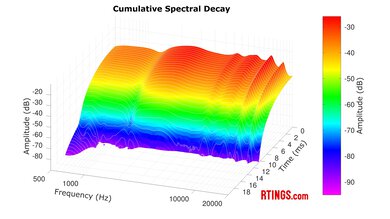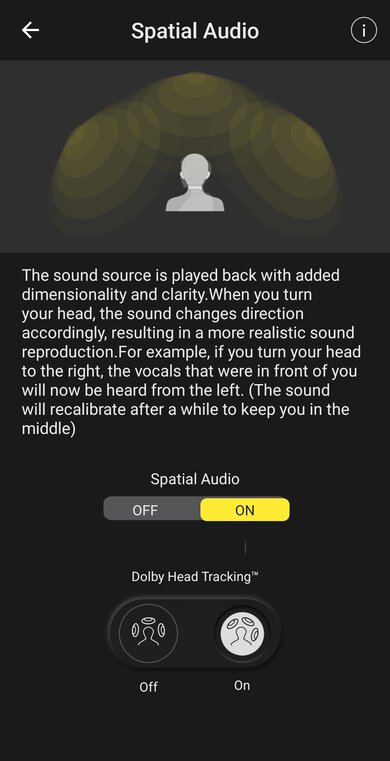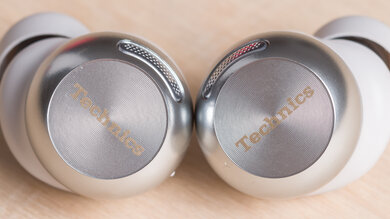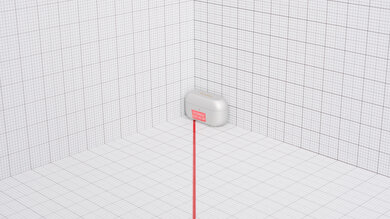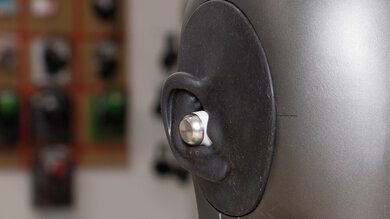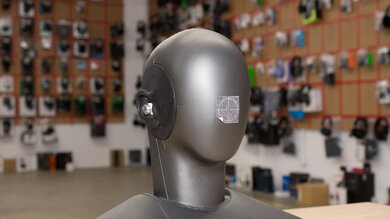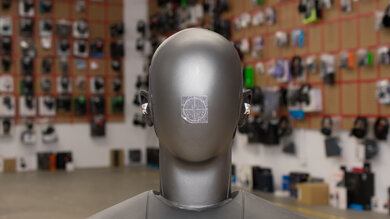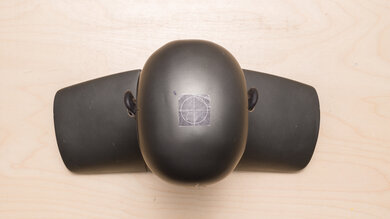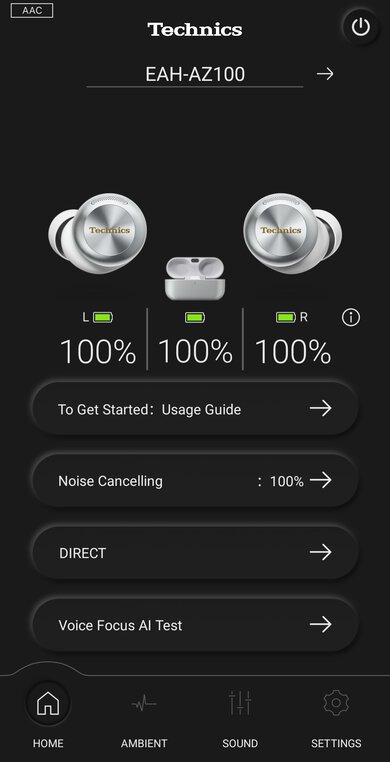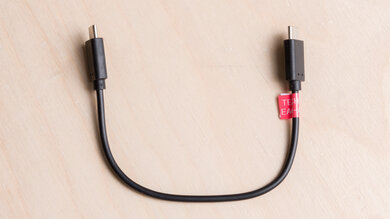The Technics EAH-AZ100 are premium flagship earbuds from the Panasonic subsidiary, Technics. Released in 2025, the earbuds are backed by the brand's 60 years of HiFi engineering experience. They feature magnetic fluid drivers, designed to reproduce low-distortion audio, and novel features like 'Voice Focus AI,' which can attenuate noise from other participants present on phone calls. The brand has also improved on the AZ100's predecessor, the Technics EAH-AZ80, by reducing their size and weight while significantly increasing battery life, among other enhancements. That said, if you've owned previous iterations of the flagship buds, their companion app and touch controls remain quite similar.
Our Verdict
The Technics EAH-AZ100 are great for sports and fitness. While they don't have ear stabilizers, the earbuds likely won't fall out of your ear, even when performing exercises that involve more explosive movement like box jumps. That said, their deeper in-ear fit can create a cabin-pressure feeling, which is intolerable for some people. The buds also have an IPX4 rating against water exposure, so you can take them for a run in the rain. The earbuds' battery lasts for over 12 hours, and the buds will be well protected in their small carrying case even if you leave them in your gym bag between workouts.
Long 12.2-hour battery life.
IPX4 certification against water exposure.
Deeper in-ear fit isn't for everyone.
The Technics EAH-AZ100 are great for travel. Their ANC strongly attenuates bass range noise from airplane and bus engines. They also have a 12.2-hour battery life, which should cover you for most lengthy flights. That said, you can pop the earbuds into their relatively small case to top up their battery or for safekeeping while you go through airport security. They're also quite comfortable, though not everyone will like their deeper in-ear fit.
Long 12.2-hour battery life.
Excellent noise isolation performance.
Deeper in-ear fit isn't for everyone.
The Technics EAH-AZ100 are very good for office work. They have top-tier noise isolation, so you can focus for a sprint without being distracted by background chatter. If you need to take calls, their microphone will do just fine, even if you're on the go and there's some background noise. Plus, you can connect to up to three devices simultaneously via Bluetooth if you're juggling calls between multiple devices. They also have over 12 hours of battery life, so you likely won't need to charge them, even if you have a long commute to and from the office.
Supports Bluetooth multi-point with up to three devices.
Long 12.2-hour battery life.
Deeper in-ear fit isn't for everyone.
The Technics EAH-AZ100 are Bluetooth-only earbuds that don't have a dongle. They also don't support GMAP, the LC3 codec dedicated profile for gaming. As a result, you'll likely experience noticeable audio/visual desync.
The Technics EAH-AZ100 are truly wireless buds; you can't use them wired.
The Technics EAH-AZ100 have very good audio reproduction accuracy. Their frequency response hardly deviates from their warm sound profile. The earbuds' bass emphasis bleeds into the mids, which can clutter denser mixes and overwhelm their relatively underemphasized treble. Depending on your content and preferences, this can lend a smoother quality to their sound. Group delay is amazingly well managed, rendering tight bass and transparent treble. Meanwhile, the L/R drivers are properly matched, reproducing a stereo image without bias or gaps with accurately placed sound objects. Additionally, the drivers generate minimal harmonic distortion even at high levels. As these are in-ears, they don't interact with your outer ear, so pinna interaction won't contribute to your perception of immersion.
The Technics EAH-AZ100 are exceptional for noise isolation. Their ANC system easily makes up for their ear tips' relatively lackluster passive isolation by attenuating most noise in frequencies from the mid-bass and up. The earbuds will easily mitigate noise from the din of airplane cabins to the rev of trucks accelerating on the street. In terms of leakage, close observers may notice a thin version of your audio that barely exceeds the noise floor of a calm room bleeding from the earbuds.
The Technics EAH-AZ100 have an unremarkable microphone. Recordings will lack body and brightness, though you'll still be intelligible. With the 'Voice Focus AI' feature enabled, you'll remain audible without being drowned out by loud, sustained background noise.
The Technics EAH-AZ100 have excellent frequency response consistency. With the appropriate ear tips and a good seal, the earbuds' audio delivery will remain replicable, and our frequency response measurements will represent most people's listening experience.
Performance Usages
Changelog
-
Updated Jan 14, 2026:
We've updated the Variants and Style sections of the review to reflect two new color options: 'Champagne' and 'Blue.'
-
Updated Jan 08, 2026:
We've updated our SBC and LDAC latency results in the Bluetooth box after testing with the 'Suppress Audio Delay' function enabled.
-
Updated Sep 08, 2025:
We've updated the article to mention the Bose QuietComfort Ultra Earbuds (2nd Gen) in Popular Headphone Comparisons.
- Updated Apr 29, 2025: Review published.
Check Price
Differences Between Sizes And Variants
The Technics EAH-AZ100 come in four variants: 'Black' (EAH-AZ100-K), 'Silver' (EAH-AZ100-S), 'Champagne' (EAH-AZ100-N), and 'Blue' (EAH-AZ100-A). Our unit is 'Silver'; you can view their label.
Let us know in the comments below if you encounter another variant, and we'll update our review.
Popular Headphones Comparisons
The Technics EAH-AZ100 are the updated version of the 2023 Technics EAH-AZ80. The brand has since made improvements to the hardware, cutting down on their physical footprint and boosting their battery life, while also introducing new features under the hood like LC3 codec support via Bluetooth LE. That said, competing flagship entries, like the Sony WF-1000XM5 Truly Wireless, have similarly wide codec support, matching the Technics coverage of LC3 and LDAC. Meanwhile, the Bose QuietComfort Ultra Earbuds (2nd Gen) live up to their name by offering a less intrusive fit, though their battery life is shorter than the aforementioned products. In terms of noise isolation, the AZ100 easily matches the performance of the incumbent leaders in earbud ANC like the Sony and Bose. The Technics also have a warm sound profile, which is fairly common among other flagship earbuds like the Sennheiser MOMENTUM True Wireless 4 and the Devialet Gemini II True Wireless.
If you're looking for more options, check out our articles on the best noise cancelling earbuds and the best wireless Bluetooth earbuds.
The Technics EAH-AZ100 are the successor to the Technics EAH-AZ80. The AZ100 are better in most aspects; their ANC performs better across the board, especially when dealing with bass range noise like engine rumble, their battery life is significantly longer at 12.2 hours, and they support newer features like Bluetooth LE's LC3 codec and virtual surround for immersive listening. That said, the AZ80 are substantially cheaper and have most of the same features.
The Technics EAH-AZ100 and the Sony WF-1000XM5 Truly Wireless are similar earbuds. While the Sony are less expensive, there are some performance tradeoffs: their battery life is a shorter 8.75 hours compared to the Technics' 12.2 hours, their virtual surround feature requires specific applications (like Sony's 360 Reality Audio Live) compared to the more ubiquitous Dolby Atmos required by the Technics, and they have less customizable controls. Both earbuds have comparable, top-tier ANC systems that handily tackle noise from airplane cabins to busy streets.
The Technics EAH-AZ100 are better earbuds than the Sennheiser MOMENTUM True Wireless 4. They have a longer battery life, a more comfortable fit, and a more comprehensive, feature-filled app. The Technics' companion app supports ANC adjustment, customizable Bluetooth multi-point with up to three devices, and virtual surround for immersive listening, to name a few. That said, the Sennheiser have a microphone with better raw recording quality and have a similarly effective ANC system. Their ear stabilizers can work better for individuals who have trouble getting earbuds to fit properly.
The Bose QuietComfort Ultra Headphones Wireless and the Technics EAH-AZ100 are fundamentally different products. While both offer some of the best ANC in their respective categories, the Bose over-ears have the upper hand in both battery life and comfort. If you're looking for portability, then the Technics in-ears win out. The Technics also have superior connectivity options, supporting three-way Bluetooth multi-point and the newer LC3 codec over Bluetooth LE. That said, both headphones have robust customization and app features, including virtual surround with head tracking for more immersive listening, though their implementation and compatibility differ.
Test Results

The Technics EAH-AZ100 don't deviate much from their predecessor, with minimal tweaks to their warm sound profile. The bass emphasis that extends to the mids and cuts in parts of the mid and treble range can lend the earbuds a lo-fi, smooth quality with a closer resemblance to the SenseLab Aizu target than our in-house curve. If you find their default sound signature isn't to your tastes, you can access multiple presets and a graphic EQ in the app. There's also a fairly substantial difference between the earbuds' frequency response with ANC enabled and disabled. They deliver more thump and a smoother mid-range with ANC disabled.
The Technics' frequency response consistency is amazing. Once you've found the right pair of silicone ear tips for your ears from their wide size selection, you'll experience replicable sound delivery even if you have to reseat or adjust an earbud.
The bass target compliance is good. Following in the footsteps of the previous generation, the Technics EAH-AZ80, the AZ100 have an elevated response throughout the entire bass region. In practical terms, you'll likely notice dialed-up thump, punch, and body from the drums and bassy synths in tracks like Brasso from the second season of Andor.
The mid-range target compliance is great. Although the Technics' frequency response generally tracks our target curve, overemphasis bleeding into the low-mid from the bass can clutter dense mixes. In the high-mid, a trough can cause vocals and instruments to sound distant.
The treble target compliance is decent. Overall, the Technics have an underemphasized treble range, heavily softening their top-end. Both the low- and mid-treble are cut, which can result in a lack of articulation and brightness in the harmonics of vocals and lead instruments. Meanwhile, a return to our target in the high-treble retains the airy quality of breathy vocals, though this can sound slightly hissy when contrasted with the more subdued response in the rest of the treble.
The Technics' peaks and dips performance is excellent. Throughout most of the audible spectrum, the buds' frequency response rarely deviates from their warm sound profile. Besides the single dip in the high-mid, which can reduce the clarity of vocals in the range, most of the deviations are localized in the high-treble. Human sensitivity in this range is lost over time, so you likely won't notice fluctuations from airy to hissy in the highest audible harmonics.
The Technics EAH-AZ100's L/R drivers are amazingly well-matched. The measured values for frequency, phase, and amplitude mismatches fall within good values. While there are some differences in the frequency and phase response of the individual drivers, they're not significant and localized to the top end, where human audibility is limited. As a result, you likely won't notice positioning issues or gaps in the stereo image. That said, while our results may give an impression of the earbuds' stereo matching, performance varies from unit to unit.
The Technics EAH-AZ100 have excellent group delay performance. This results in tight bass, defined transients, and transparent treble.
These in-ears bypass your outer ear and won't interact with your pinna.
The Technics EAH-AZ100 have fantastic distortion performance. Even in our loudest testing conditions, harmonic distortion generated by the earbuds won't result in perceivable colorations to your audio.
The Technics buds aren't wired and don't need an amp to drive them.
These are the test settings used to test the earbuds. Our results are only valid when used in this configuration.
The Technics EAH-AZ100 have a rounded shape similar in design to the Google Pixel Buds Pro 2, though they don't have an obvious stabilizer. Instead, their design offsets their nozzle housing from the controls housing with a gentle contour. This facilitates their fit and stability by nestling into your concha. Like the Technics EAH-AZ80, their construction features smooth plastic and aluminum, with a brushed concentric ring finish on their control surfaces and a centered copper-colored Technics logo. They come in four color variants: 'Black,' 'Silver,' 'Champagne,' and 'Blue.'
The Technics EAH-AZ100 have a comfortable in-ear fit. Their silicone ear tips feel soft to the touch and come in five different sizes, so you'll likely find a set that's comfortable for you. That said, the earbuds have a deeper in-ear fit, which can create a plunger-like feeling you may find annoying. While their total footprint is smaller than the Technics EAH-AZ80, their fit can be fatiguing as the section of the earbuds that rests in your concha can apply pressure near the bottom of your ear.
These buds have impressive controls. They have simple, intuitive touch commands with extensive customization options available through their dedicated app. Additionally, their new design reduces the frequency of accidental inputs by providing more room to adjust the earbuds in your ear without interacting with control surfaces.
The earbuds have distinct chimes signaling pairing, touch commands, and min/max volume. You can also enable additional voice prompts in the app. That said, their control scheme isn't perfect: multi-tap controls can take some time to master, and audible feedback from the earbuds stays at the same volume regardless of your playback volume. This can be jarring if you're listening to content at quiet levels; fortunately, you can reduce the volume of the earbuds' feedback in their app.
The Technics also have two independently customizable touch sensor mappings for general use and calls.
The earbuds come with an impressive case. Their case's design is nearly identical to that of their predecessor, the Technics EAH-AZ80, with a sturdy plastic construction. That said, the case's hinge has a bit more give than the previous generation's. The case also has an exterior-facing indicator, though you can only confirm whether the earbuds are fully charged or not.
The Technics EAH-AZ100 have impressive build quality. They come with very high-quality silicone tips, and the earbuds themselves are built with materials that feel sturdy. While the case's materials also match the earbuds' quality, its hinge does have a bit of wobble. Like the Technics EAH-AZ80, the earbuds' IPX4 rating does not extend to the case.
The Technics EAH-AZ100 have excellent full-range noise isolation. While their ear tips don't do much to block out noise passively, their ANC system mitigates noise across the audible spectrum, with a slight falloff in effectiveness in the low-bass region. That said, this is normal for most ANC systems. Overall, ambient chatter, chunky footsteps, and fan noise will be adequately attenuated by the Technics with ANC enabled.
While the included results were measured with the 'Adaptive (Auto-optimization)' mode disabled, the earbuds' noise isolation performance is nearly identical even with the setting enabled. For users who prefer the 'Adaptive' mode, there are additional settings to modify its baseline attenuation in the 'Optimizing noise cancellation (pre-adjustment)' settings, though the slider doesn't change the performance much.
It's also worth noting that the headphones allow you to cycle through ANC modes through the app and onboard controls even while on calls.
These buds have remarkable noise isolation in common scenarios. They provide significant attenuation against lower-range frequencies like the rumble of plane engines or semi-trucks on the street. They also easily tackle higher-frequency noise like coworkers chatting and office chairs squeaking.
Wind noise arises from ANC systems due to direct physical interactions with their microphones; this results in the system creating loud noises in an attempt to cancel sound that won't affect you.
While the Technics don't have a wind reduction feature, their ANC has a strength slider you can use to reduce the impact of wind noise. At our tested ANC strength (maxed out), they do generate a fair bit of noise in windy conditions, so you may want to tweak them.
Additionally, the earbuds come equipped with 'Voice Focus AI,' a software solution available with their app to reduce noise in both directions of a call: the feature reduces wind noise picked up by the microphones when you're on calls, but likely won't affect ANC.
The Technics AZ100 have amazing leakage performance. Audio leakage will mostly be in the treble frequencies, rendering a thin replica of your audio that's barely audible past the noise floor of a calm room.
The integrated mic's recording quality is poor. While your voice remains intelligible, the truncated bass and treble frequencies mean your speech won't be rendered with much depth or brightness.
These buds do a decent job of separating your voice from noise in your environment. In the more synthetic pink noise test, the mic can't completely cut background noise while you speak, which can be a bit distracting. That said, loud sustained noises are handily attenuated, keeping your voice audible. When you aren't speaking, a noise gate is active, cutting all sound completely, too.
The earbuds come equipped with a software solution for noise reduction, 'Voice Focus AI,' which you can toggle on for calls in the earbuds' companion app. It reduces noise coming from your microphone and cleans up audio from your conversation partner(s), too. The results in the review are with the attenuation active for the microphone output.
The Technics EAH-AZ100 have an impressive battery. They last a surprising 12.2 hours, which is higher than their advertised 10 hours with ANC on and continuous playback. Their case also holds an additional 1.5 charges if you need to top them up on the go. The manufacturer also provides additional battery life estimations in their owner's manual. Notably, battery life drops when using LDAC or when on calls. The earbuds also support quick charging, meant to give you 90 minutes of ANC on, basic codec playback (AAC/SBC) after 15 minutes of charging.
While the Technics app has been renamed to Audio Connect for the latest iteration of their flagship earbuds, the earbuds' iOS- and Android-compatible software retains all the functionality available with the previous Technics EAH-AZ80.
Aside from standard functionality expected from a premium product like presets and an eight-band equalizer, the app has extensive feature coverage. You can adjust the strength of 'Noise Cancelling' and 'Ambient Sound' modes independently, enable 'Spatial Audio' with head tracking for immersive virtual surround when paired with Dolby Atmos content, and find the headphones by emitting a loud chime or using historical location data. The control schemes for both calls and audio playback are fully (and independently) remappable through the app as well. You can also toggle 'Voice Focus AI' to attenuate noise from your microphone input and/or audio originating from conversation partners in calling apps like Teams.
There are more niche features for adjusting auto power-off behavior, controlling the number of possible connections with Bluetooth multi-point, and cycling through codecs. For a more comprehensive overview of the app, you can check out a video tour and read up on details in the owner's manual.
The Technics EAH-AZ100 have outstanding Bluetooth connectivity. They retain three-way Bluetooth multi-point from the Technics EAH-AZ80 and cover the same SBC, AAC, and LDAC audio codecs with the new inclusion of LC3 through Bluetooth LE. That said, depending on the codec in use, multi-point functionality will vary; the earbuds don't support multi-point at all when connecting with LC3. While the earbuds support LDAC when connected to up to two devices, the companion app recommends using only one device for the best audio quality. As expected from the LDAC and SBC codecs, audio latency is quite high, but we used the 'Suppress Audio Delay' function within the app to bring it within much more reasonable levels during testing. Different devices and apps may introduce additional levels of compensation, however, so your experience may vary.
Unfortunately, we weren't able to measure the Technics' LC3 latency using our Creative BT-W6. That said, you can expect latency to be significantly lower with this codec due to its more modern standards. It's also worth mentioning that Bluetooth LE isn't widely adopted, so you'll need a compatible device to make use of LC3.
The earbuds can connect to PCs that have Bluetooth for mic and audio functionality. However, they don't support any other connection types.

